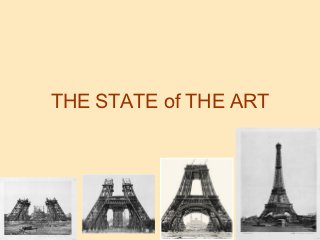
Facilitation state of the art
- 1. THE STATE of THE ART
- 2. CONSIDER MOBILE PHONES The state of the art has grown The deliverables are different From to
- 3. CONSIDER PROGRAMMING 1965 A few whiz kids could do it very well Able people could do it, but slowly and not reliably well Lots of books about maths algorithms. Not very helpful The best way to learn was from a whiz
- 4. CONSIDER PROGRAMMING 1965 A few whiz kids could do it very well Able people could do it, but slowly and not reliably well Lots of books about maths algorithms. Not very helpful The best way to learn was from a whiz 1980 The books said write structured code Not everyone is convinced > enforced standards
- 5. CONSIDER PROGRAMMING 1965 A few whiz kids could do it very well Able people could do it, but slowly and not reliably well Lots of books about maths algorithms. Not very helpful The best way to learn was from a whiz 1980 The books said write structured code Not everyone is convinced > enforced standards 1995 The books said write object-oriented code Now practitioners and academics begin to agree
- 6. CONSIDER PROGRAMMING 1965 A few whiz kids could do it very well Able people could do it, but slowly and not reliably well Lots of books about maths algorithms. Not very helpful The best way to learn was from a whiz 1980 The books said write structured code Not everyone is convinced > enforced standards 1995 The books said write object-oriented code Now practitioners and experts begin to agree What next?
- 7. FACILITATION is DIFFERENT • Technology is deterministic and predictable • People are much more complex, unpredictable • People have rights, may feel a sense of duty • People can choose to dissemble (to lie) • New ideas take a long time to validate, context specific • Ideas about people change more slowly • Old theories last longer Human Activity Systems (HAS) create new meanings Each individual tries to keep their behaviour ok, all the time, as judged by many conflicting meanings (ref: Merleau Ponty)
- 8. WHAT CAN WE DO NOW? • Listen and learn from the best facilitators. • Compare them with other facilitators. • Talk to colleagues. Find a mentor. • Read about facilitating other things. • Read lots (Craig Larman & Alistair Cockburn seek empirical evidence) • Be aware of the current fashions. • Select what makes sense to you • Use ideas that make sense to the best facilitators.
- 9. FACILITATION NOW A few really effective facilitators, quite rare Able people can do it, not reliably successful Lots of books about facilitating other things
- 10. FACILITATION NOW A few really effective facilitators, quite rare Other people who can do it, not reliably Lots of books about facilitating other things We’re only just starting. End-point uncertain You will see this story through… Enjoy!
